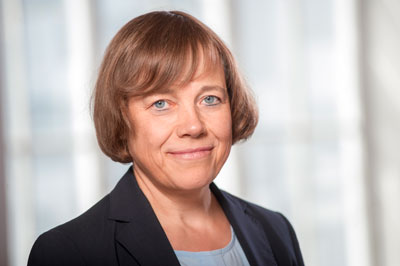Foreword
“I was a stranger and you welcomed me.” The church has always heard a clear mandate in this phrase: Christ calls us to his side – he who, at the Last Judgment, changes places with the hungry and sick, with prisoners and strangers.

Präses Annette Kurschus
In autumn 2015 large numbers of people came into a country in a very short time. They were looking for protection from war and persecution, and for new future prospects. The church, too, inquired what needed to be done in a practical way. Congregations and church districts, offices and agencies, and above all many volunteers offered practical assistance, and they still do. This assistance ranged from housing to clothing, from accompaniment in visits to the authorities and even to sanctuary in our churches. In time, however, deeper questions and new challenges have surfaced in society and the church. Fundamental concerns were expressed. Neglected problems have cropped up. Conflicts have escalated, even into open violence.
“I was a stranger and you welcomed me.” The biblical phrase stimulates us to see strangers as more than merely needy people needing help. People from other cultures, with other religions and languages, coming from another political context – that is sometimes scary and alienating to people, which we must not be play down or explain away. Refugees and migrants are people who say “I”, who have their own story and can tell of their concerns and hopes. They are active and do not want to remain objects of pity and affection, of skepticism or fear.
“You welcomed me.” We need to be very willing to change in order for such a welcome to be possible. It calls for a lot of openness to enable genuine arrival and real togetherness. With those who come and with those who are there.
The fact that the strangeness of Christ himself meets us in the challenges is a gentle presentiment, powerful provocation and profound promise at the same time.
It is important to look and listen carefully, to clearly name facts and questions, to take a position and live with perplexity. And it is out of the question to reject strangeness out of hand, seeing it as a threat and understanding migration and refugee movements merely as problems.
Christ as the Lord of the Church gives himself to the church as a gift.
This slight presentiment, this powerful provocation, this profound promise has also been understood in the Evangelical Church of Westphalia. At many places and in many different ways it has brought surprising
and happy experiences..
This makes us grateful and hopeful. It prompts us to ask curious questions about what refugees bring with them and what they need. How can we serve peace in questions of displacement and migration, strengthen our life together and respect the dignity of all? We may well be amazed at the many opportunities for the church to change and open up, in order to encounter its stranger Lord anew.
This keynote paper is an invitation to reflect and inquire, to supplement and critique, to engage in respectful argument and make surprising discoveries.
I would like to thank all those responsible for their efforts, care and creativity in producing this paper. May God bless all those who read and reflect on it, and add their contributions and questions.
Annette Kurschus
Präses


